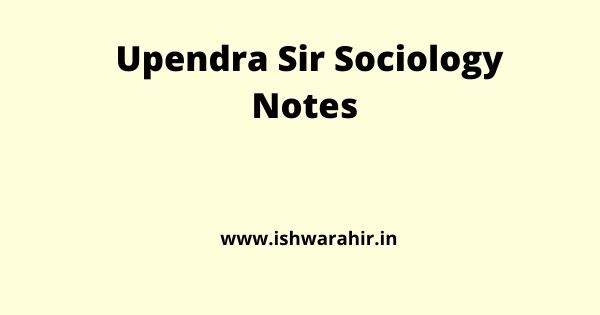Upendra Sir Sociology Notes gives the best version of the social contents and examples in the best way. It is one of the popular books for the aspirants who are all preparing for the civil service exams or UPSC exams. It also provides the solved exam question papers for some years. It helps the students understand the exam pattern, and because of it, the students can learn about the idea of the exam methodology. The pupil who is all preparing and going to prepare for civil service exams can highly refer to this pdf to gain much more knowledge in the social contents and examples.
Upendra Sir Sociology Notes
It consists of Fundamentals of sociology, Sociology – The Discipline, Modernity and social changes in Europe and emergence of Sociology, Scope of the subject and comparison with other social sciences, Sociology and common sense, Sociology as Science, Science, scientific method and critique, Major theoretical strands of research methodology, Positivism and its critique, Fact value, and objectivity, Non-positivist methods, Research Methods and Analysis, Qualitative and quantitative methods, Techniques of data collection, Variables, sampling, hypothesis, reliability, and validity.
Upendra Sir Sociology Notes PDF
It includes Sociological Thinkers, Karl Marx – Historical materialism, mode of production, alienation, class struggle, Emile Durkhteim – Division of labor, social fact, suicide, religion and society, Max Weber – Social action, ideal types, authority, bureaucracy, the protestant ethic and the spirit of capitalism, Talcolt Parsons – Social system, pattern variables, Robert K. Merton – Latent and manifest functions, conformity and deviance, reference groups, Mead – Self and identity, Stratification and Mobility, Concepts – equality, inequality, hierarchy, exclusion, poverty and deprivation, Theories of social stratification – Structural functionalist theory, Marxist theory, Weberian theory, Dimensions – Social stratification of class, status groups, gender, ethnicity, and race. So, it is considered the best one for preparing for the competitive exams. It is highly recommended for the successful completion of the UPSC exams.
Upendra sir Sociology Handwritten Notes
Upendra sir sociology handwritten notes pdf free download is the Extensive and Comprehensive Notes prepared by Upendra Sir. These Class notes by Upendra Sir for Sociology are in English Language and it makes you finish it within a month if you study hard.
Sociology Syllabus for UPSC Main Examination
Paper-I
Fundamentals of sociology
- Sociology – The Discipline:
(a) Modernity and social changes in Europe and emergence of Sociology.
(b) Scope of the subject and comparison with other social sciences.
(c) Sociology and common sense. - Sociology as Science:
(a) Science, scientific method, and critique.
(b) Major theoretical strands of research methodology.
(c) Positivism and its critique.
(d) Fact value and objectivity.
(e) Non-positivist methodologies. - Research Methods and Analysis:
(a) Qualitative and quantitative methods.
(b) Techniques of data collection.
(c ) Variables, sampling, hypothesis, reliability, and validity. - Sociological Thinkers:
(a) Karl Marx – Historical materialism, mode of production, alienation, class struggle.
(b) Emile Durkhteim – Division of labor, social fact, suicide, religion, and society.
(c) Max Weber – Social action, ideal types, authority, bureaucracy, the protestant ethic, and the
spirit of capitalism.
(d) Talcolt Parsons – Social system, pattern variables.
(e) Robert K. Merton – Latent and manifest functions, conformity and deviance, reference
groups.
(f) Mead – Self and identity. - Stratification and Mobility :
(a) Concepts – equality, inequality, hierarchy, exclusion, poverty, and deprivation.
(b) Theories of social stratification – Structural functionalist theory, Marxist theory, Weberian
theory.
(c) Dimensions – Social stratification of class, status groups, gender, ethnicity, and race.
(d) Social mobility – open and closed systems, types of mobility, sources, and causes of mobility. - Works and Economic Life:
(a) Social organization of work in different types of
society – slave society, feudal society, industrial capitalist society
(b) Formal and informal organization of work.
(c) Labour and society.
3 - Politics and Society:
(a) Sociological theories of power.
(b) Power elite, bureaucracy, pressure groups, and political parties.
(c) Nation, state, citizenship, democracy, civil society, ideology.
(d) Protest, agitation, social movements, collective action, revolution. - Religion and Society:
(a) Sociological theories of religion.
(b) Types of religious practices: animism, monism, pluralism, sects, cults.
(c) Religion in modern society: religion and science, secularization, religious revivalism, fundamentalism. - Systems of Kinship:
(a) Family, household, marriage.
(b) Types and forms of family.
(c) Lineage and descent.
(d) Patriarchy and the sexual division of labor.
(e) Contemporary trends. - Social Change in Modern Society:
(a) Sociological theories of social change.
(b) Development and dependency.
(c) Agents of social change.
(d) Education and social change.
(e) Science, technology, and social change.
Paper-II
Indian Society: Structure And Change
A. Introducing Indian Society:
(i) Perspectives on the Study of Indian Society :
(a) Indology (G.S. Ghure).
(b) Structural functionalism (M. N. Srinivas).
(c) Marxist sociology (A. R. Desai).
(ii) Impact of colonial rule on Indian society :
(a) Social background of Indian nationalism.
(b) Modernization of Indian tradition.
(c) Protests and movements during the colonial period.
(d) Social reforms.
B. Social Structure:
(i) Rural and Agrarian Social Structure:
(a) The idea of Indian village and village studies.
(b) Agrarian social structure— the evolution of land tenure system, land reforms.
(ii) Caste System:
(a) Perspectives on the study of caste systems: G. S. Ghurye, M. N. Srinivas, Louis Dumont, Andre Beteille.
(b) Features of the caste system.
(c) Untouchability-forms and perspectives
(iii) Tribal Communities in India:
(a) Definitional problems.
(b) Geographical spread.
(c) Colonial policies and tribes.
(d) Issues of integration and autonomy.
(iv) Social Classes in India:
(a) Agrarian class structure.
(b) Industrial class structure.
(c) Middle classes in India.
(v) Systems of Kinship in India
(a) Lineage and descent in India.
(b) Types of kinship systems.
(c) Family and marriage in India.
(d) Household dimensions of the family.
(e) Patriarchy, entitlements, and the sexual division of labor.
(vi) Religion and Society :
(a) Religious communities in India.
(b) Problems of religious minorities.
C. Social Changes in India:
(i) Visions of Social Change in India:
(a) Idea of development planning and a mixed economy.
(b) Constitution, law, and social change.
(c) Education and social change.
(ii) Rural and Agrarian Transformation in India:
(a) Programmes of rural development, Community Development Programme, cooperatives, poverty alleviation schemes.
(b) Green revolution and social change.
(c) Changing modes of production in Indian agriculture.
(d) Problems of rural labor, bondage, migration.
(iii) Industrialization and Urbanisation in India:
(a) Evolution of the modern industry in India
(b) Growth of urban settlements in India.
(c) Working class: structure, growth, class mobilization.
(d) Informal sector, child labor.
(e) Slums and deprivation in urban areas.
(iv) Politics and Society :
(a) Nation, democracy, and citizenship.
(b) Political parties, pressure groups, social and political elite.
(c) Regionalism and decentralization of power.
(d) Secularization.
(v) Social Movements in Modern India :
(a) Peasants and farmers’ movements
(b) Women’s movement.
(c) Backward classes & Dalit movements.
(d) Environmental movements.
(e) Ethnicity and Identity movements.
(vi) Population Dynamics :
(a) Population size, growth, composition, and distribution.
(b) Components of population growth: birth, death, migration.
(c) Population Policy and family planning.
(d) Emerging issues: aging, sex ratios, child and infant mortality, reproductive health.
(vii) Challenges of Social Transformation :
(a) Crisis of development: displacement, environmental problems, and sustainability.
(b) Poverty, deprivation, and inequalities.
(c) Violence against women.
(d) Caste conflicts.
(e) Ethnic conflicts, communalism, religious revivalism.
(f) Illiteracy and disparities in education.
PDF Details
| BOOK NAME: | Upendra Sir Sociology pdf download |
| AUTHOR: | Upendra Sir |
| LANGUAGE: | English |
| FILE FORMAT: | PDF, Kindle edition |
| PDF SIZE: | 7MB |
Download Upendra Sir Sociology Notes
We are giving as many Notes as possible. If the link is not working, you can inform us in the comment section. We will check that and update you as soon as possible.
Paper 1 Vol -1 Click here to Download
Paper 1 Vol -2 Click here to Download
More study materials,
Download Ethics Integrity and Aptitude PDF by G Subba Rao For Free
Download Anudeep Durishetty Book PDF For Free
Lukmaan IAS Ethics Notes PDF Download For Free
Download PMF IAS Geography PDF For Free
Download Shankar Ganesh Economy PDF For Free
Download Shubhra Ranjan PSIR Notes For Free
Download Telugu Grammar PDF For Free
Download Tusharanshu Sociology Notes For Free
You can join our Telegram channel to To Download the Files.
Disclaimer: Iswarahir.in Does not own this PDF, neither created nor scanned. We provide the link already available on the internet. If it violates the law or has any issues, kindly Contact us to request the removal of the link.

